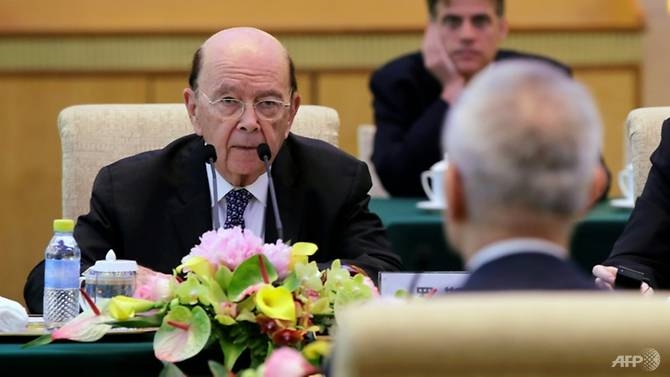US, China reach US$1.4b ZTE deal amid signs of progress on trade
 |
| US Commerce Secretary Wilbur Ross, who announced a deal to ease sanctions on Chinese firm ZTE, is seen at a Jun 3 meeting in Beijing with Chinese Vice Premier Liu He. (AFP/Andy Wong) |
US Commerce Secretary Wilbur Ross, who announced the deal, reiterated a denial that there was any connection between the two.
But the ZTE settlement comes just days after Beijing reportedly offered to ramp up purchases of American goods to help cut the yawning trade imbalance with the United States - moving part-way towards meeting a major demand of US President Donald Trump.
The defusing of tensions with Beijing is good news for Trump, who is preparing to face outraged allies at this week's Group of Seven summit in Canada, where Europe and Canada will voice their strenuous objections to US steel and metal tariffs.
Not all was rosy - US lawmakers threatened legal action against the ZTE deal, saying the telecoms firm posed an "espionage risk" to the United States in addition to having violated its sanctions on Iran and North Korea.
Ross told CNBC on Thursday the deal was tough and would keep ZTE on a short leash.
"This is a pretty strict settlement - the strictest and largest settlement fine that has ever been brought by the Commerce Department against any violator of export controls," he said.
In April, Washington banned the sale of crucial US components to the company after finding it had repeatedly lied and failed to take action against workers responsible for the sanctions violations.
The company was fined US$1.2 billion last year. But under the deal announced on Thursday, ZTE will pay an additional US$1 billion penalty and put another US$400 million in escrow to cover possible future violations.
ZTE will also be required to change its entire board of directors and hire outside legal compliance specialists who will report to the Commerce Department for 10 years.
In return, Washington will strike the company from a sanctions list.
ANOTHER SHOE TO DROP?
Both Republican and Democratic lawmakers threatened to take congressional action that could block or alter the deal, calling ZTE a threat to US national security.
"There is absolutely no good reason that ZTE should get a second chance and this decision marks a 180-degree turn away from the president's promise to be tough on China," Chuck Schumer, the Senate's top Democrat, said in a statement.
"It's up to Congress now to act to reverse the deal."
Republican Senator Marco Rubio said: "After today's decision to give #ZTE a pass, we have introduced a bipartisan amendment to restore penalties on ZTE."
The clash raised the prospect that Trump's own Republican party could work to undermine key planks of his trade agenda.
Despite the settlement, there was no sign Trump had veered from plans this month to impose as much as US$50 billion in tariffs on Chinese imports to punish Beijing for its alleged theft of American technology and know-how.
Washington and Beijing have pursued a halting series of trade talks, with Trump demanding a US$200 billion reduction in its trade deficit with China.
Ross insisted the ZTE deal was an enforcement matter unrelated to the trade talks, which he has led.
"It happens that I have been involved with the other negotiations with China. But that's quite separate," he told CNBC.
But Ross's denial appeared to conflict with Trump's own public statements.
In a tweet posted May 14, Trump said the new ZTE deal was "reflective of the larger trade deal we are negotiating with China."
US officials say China last weekend offered to buy an additional US$70 billion in US goods to cut the trade deficit - on condition that Trump call off the planned tech-sector tariffs.
William Reinsch, a trade expert at the Center for Strategic and International Studies, said the ZTE offer suggested Beijing had made concessions to Trump on trade but it remained unclear whether these were of equal value.
Beijing's reported offer to buy $70 billion in goods was "peanuts" compared to the $200 billion cut in the US trade deficit with China that Trump demanded, Reinsch told AFP.
"It's hard to believe there's no linkage but Ross clearly left Beijing without anything last weekend," he said. "I think there's another shoe to drop."
What the stars mean:
★ Poor ★ ★ Promising ★★★ Good ★★★★ Very good ★★★★★ Exceptional
 Tag:
Tag:
Related Contents
Latest News
More News
- Rising consumption and travel fuel ‘Tet season’ stocks (February 11, 2026 | 11:43)
- Education as strategic capital: why Dwight School Hanoi represents a long-term investment in Vietnam’s future (February 10, 2026 | 19:00)
- Green logistics–the vital link in the global energy transition (February 09, 2026 | 19:35)
- Wages and Lunar New Year bonuses on the rise (February 09, 2026 | 17:47)
- Temporary relief for food imports as businesses urge overhaul of regulations (February 07, 2026 | 09:00)
- Opella and Long Chau join forces to enhance digestive and bone health (February 06, 2026 | 18:00)
- Vietnam-South Africa strategic partnership boosts business links (February 06, 2026 | 13:28)
- Sun PhuQuoc Airways secures AJW Group support for fleet operations (February 06, 2026 | 13:23)
- Pegasus Tech Ventures steps up Vietnam focus (February 05, 2026 | 17:25)
- The generics industry: unlocking new growth drivers (February 04, 2026 | 17:39)






















 Mobile Version
Mobile Version